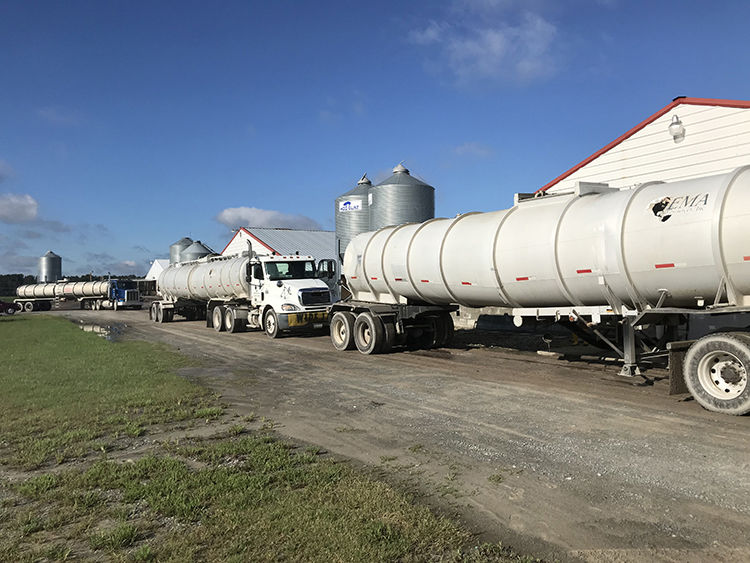Even though Hurricane Florence has passed and flood waters are receding, North Carolina agriculture still has a lot to deal with.
The North Carolina Department of Agriculture and Consumer Services has inspectors and field forces assessing the damage to the agricultural industry. Preliminary livestock losses are 3.4 million poultry and an estimate of 5,500 hogs. Crop loss estimates are yet to be determined.
“This was an unprecedented storm with flooding expected to exceed that from any other storms in recent memory. We know agricultural losses will be significant because the flooding has affected the top six agricultural counties in our state,” said Agricultural Commissioner Steve Troxler. “The footprint of flooding from this storm covers much of the same area hit by flooding from Hurricane Matthew in 2016, which only worsens the burden on these farmers.”
Brandon Warren, president of the North Carolina Pork Council and a hog farmer, said farmers and others in the pork industry worked together to take precautions to protect farms, animals and the environment. “The preparations for the hurricane began long before the few days before the storm. Our farmers take hurricane threats extremely seriously,” Warren said.
In some cases, hogs were moved to higher ground in known flood-prone areas. Feed supplies were put in place, hog farmers assessed lagoon levels and secured generators and fuel supplies for power outages.
The North Carolina hog industry has an inventory of 8.9 million hogs on 2,100 farms. North Carolina farmers took extraordinary measures in advance of the storm to move thousands of animals out of harm’s way. The North Carolina Department of Agriculture and Consumer Services Emergency Programs and Veterinary Services divisions reported approximately 5,500 hogs died as a result of the storm. The North Carolina Pork Council said in a statement on Sept. 19, “Five days after Hurricane Florence struck North Carolina, most of our 2,100 hog farms are returning to normal operations. For a small portion of farms, logistical challenges amid record levels of flooding continue as farmers and partner production companies are taking extraordinary steps to ensure animal care by staying at the facilities or using boats to reach the barns.”
In 1999, during Hurricane Floyd, 21,000 hogs were killed in North Carolina. The losses with Hurricane Matthew in 2016 were 2,800 head.
Matt Poore, North Carolina State University Extension ruminant nutrition specialist, said livestock losses from the hurricane need to be documented for producers to apply for funds through the Livestock Indemnity Program. Producers with hay and feed losses can also contact their Farm Service Agency office to discuss emergency assistance.
“After Hurricane Matthew in 2016, we inspected hay that had been flooded to various extents. Hay that had been flooded in more than one foot of water was found to be severely damaged with little usable forage remaining,” Poore said.
Poore said flooded pastures will show different levels of damage based on what grasses are present. Bermuda grass and Bahia grass pastures will survive longer under flood waters than fescue pastures will.
“Livestock can be vulnerable to a number of diseases following a flooding event including respiratory disease, clostridial diseases, leptospirosis, infections from cuts, and other skin or hoof problems from exposure to water or wet conditions,” Poore said.
The concern is flooded crops will not only have lower yields, quality loss or complete loss, but also that these crops will not be able to be used for human food and will need tested before being used for animal feed.
“Floodwater may contain sewage, harmful organisms, pesticides, chemical waste or other substances,” Troxler said. “Also, wet foods may grow mold, which can produce toxins that can harm humans and animals.”
The U.S. Food and Drug Administration guidance applies to crops flooded with water from rivers, creeks or streams. Pooled water or rainwater in fields is different and not likely to contaminate field crops.
For more information on hurricane recovery, visit https://www.ces.ncsu.edu.
Jennifer Carrico can be reached at [email protected].



